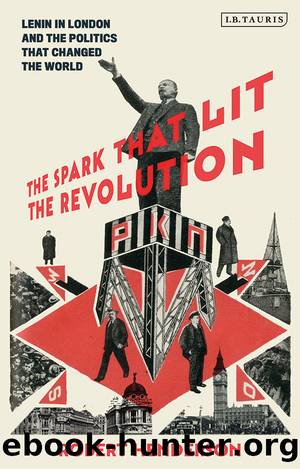The Spark That Lit the Revolution by Robert Henderson;

Author:Robert Henderson;
Language: eng
Format: epub
Publisher: Bloomsbury UK
5
The London Congress of 1907 and the triumph of Lenin
A regal visit
It was not long after Lenin’s return to his homeland that the inevitable reaction set in. With the appointment of Petr Stolypin as Minister of the Interior in April 1906 and then, three months later, as Prime Minister, the number and the violence of reprisals against opponents of the tsarist regime increased dramatically. As a result, many were forced into exile once more, including Lenin, who had spent much of that year conspiratorially shuttling between St Petersburg and the village of Kuokkala just over the Finnish border. In early 1907, however, fearing for his safety, he decided to leave Russia for good and a few months later settled once more in Geneva. At the Fourth Party Congress held in Stockholm in the spring of 1906 (the so-called Unity Congress) his Bolshevik faction had come under attack from the wider membership for their support of armed insurrection and violent expropriations, leaving the Mensheviks in the ascendancy. Following this defeat, Lenin had initially appeared to go along with proposals that the two factions should now bury their differences and attempt to heal the split in the Party. However, in reality, he was already planning his counter-attack and, in preparation for the next party Congress, which was due to be held in Copenhagen in May 1907, he had set up a secret ‘Bolshevik Centre’, whose role was to lead his Party and control its activities and finances. In so doing, he had acted in flagrant disregard of the RSDLP’s prohibition of separate committees within the Party. Lenin was all for unity, so long as that end was achieved by the complete subordination of all other factions to the will of the Bolsheviks.
Meanwhile, the government of Nicholas II, while continuing its violent suppression of all opposition at home, was attempting to reinvent itself on the international stage as a benign and friendly power. As a reaction to the Triple Alliance – the defence agreement drawn up between Germany, Austro-Hungary and Italy – Russia made a series of overtures towards France and Britain which, in August 1907, would result in the ratification of the Triple Entente. Although not committing the countries to raise arms on behalf of each other in event of war, the agreement, nevertheless, obliged them to offer moral support to their co-signatories in such an eventuality. In addition to his government’s pursuit of such international political agreements, the tsar himself and, indeed, other members of his family, embarked on a series of foreign visits designed to raise the Romanov profile and to further strengthen Russia’s ties with her European neighbours.
So it was, that in March 1907, the Russian Dowager Empress Marie arrived in Britain on an ostensibly private and personal visit to her sister Queen Alexandra, wife of King Edward VII. Her only previous visit to England had been as far back as 1874 when she attended the marriage of her sister-in-law, the Grand Duchess Marie to Queen Victoria’s second son, Alfred, Duke of Edinburgh.
Download
This site does not store any files on its server. We only index and link to content provided by other sites. Please contact the content providers to delete copyright contents if any and email us, we'll remove relevant links or contents immediately.
| Arms Control | Diplomacy |
| Security | Trades & Tariffs |
| Treaties | African |
| Asian | Australian & Oceanian |
| Canadian | Caribbean & Latin American |
| European | Middle Eastern |
| Russian & Former Soviet Union |
The Secret History by Donna Tartt(16610)
The Social Justice Warrior Handbook by Lisa De Pasquale(11485)
Thirteen Reasons Why by Jay Asher(7782)
This Is How You Lose Her by Junot Diaz(5753)
Weapons of Math Destruction by Cathy O'Neil(5030)
Zero to One by Peter Thiel(4817)
The Myth of the Strong Leader by Archie Brown(4785)
Promise Me, Dad by Joe Biden(4440)
Stone's Rules by Roger Stone(4412)
Beartown by Fredrik Backman(4404)
How Democracies Die by Steven Levitsky & Daniel Ziblatt(4392)
The Fire Next Time by James Baldwin(4336)
100 Deadly Skills by Clint Emerson(4070)
A Higher Loyalty: Truth, Lies, and Leadership by James Comey(4025)
Rise and Kill First by Ronen Bergman(4008)
The David Icke Guide to the Global Conspiracy (and how to end it) by David Icke(3875)
The Farm by Tom Rob Smith(3869)
Secrecy World by Jake Bernstein(3773)
The Doomsday Machine by Daniel Ellsberg(3725)
